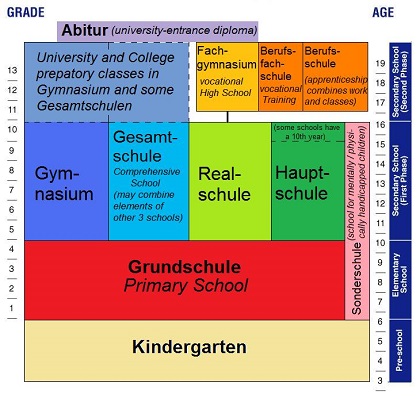
Education is free and in most types of school is coeducational. Almost all elementary and secondary schools and about 95 percent of higher education institutions are public. When churches or private organizations run kindergartens, they do so independently, and the public sector is not involved.
According to the terms of the Düsseldorf Treaty of 1955, the first major attempt to unify or coordinate the school systems of the Länder, school attendance is mandatory for a minimum of nine years (or in some Länder ten years), beginning at age six. A student who starts vocational training as an apprentice must attend a part-time vocational school until the age of eighteen.
Primary school ( Grundschule) starts between the ages of five-and-a-half and six-and-a-half, depending on the month your child was born. The first day of primary school is a very important event for German children. Customs include giving children a bag of sweets ( Schultüte) on their first day of school.
Primary school normally lasts for four years, after which parents receive a recommendation from the teachers concerning the type of schools most appropriate for his continuing education in secondary school. This recommendation is based on the teacher’s evaluation of the child’s performance, abilities and interests. If a child has learning difficulties, the teacher might recommend sending it to a special school for slow learners ( Sonderschule).
After primary school students may attend a Hauptschule, Mittelschule, Regionale Schule or a Realschule, which are more vocationally orientated, a Gymnasium, which is more academically oriented, or a Gesamtschule, which is comparable to a Comprehensive School.
- Hauptschule (until 10th grade) – prepares pupils for vocational education and ends with a Hauptschulabschluss. The Hauptschule is designed for those who are less academically gifted. Graduates generally enter an apprenticeship ( Lehre) in a manual trade, sometimes combined with some part-time studies at a Berufsschule.
- Realschule (until 10th grade) – offers a broader range of emphasis for intermediary students and ends with a Realschulabschluss. The Realschule is designed for those who will be entering an apprenticeship in a commercial trade or medical profession such as nursing, the emphasis is more on mathematics and language skills than on manual activities.
- Mittelschule (grades 5-10) Only some German states have this type of intermediate school (grades 6-10) that combines the Hauptschule and Realschule tracks.
- Gymnasium (until 12th or 13th grade) – prepares students for higher education and ends with the Abitur(a prerequisite for enrolling in university). This is the most demanding type of schooling, with 32 to 40 hours of lessons per week and lots of homework.
Related Articles:
Why German Kids Carry a Giant Cone on Their First Day of School
German Dual Vocational Training System
German education system
German Education: An Overview of Excellence and Innovation
List of Universities in Germany
Education in Germany
Secondary Education in Germany
Vocational Education and Training in Germany
Tertiary or Higher Education in Germany
